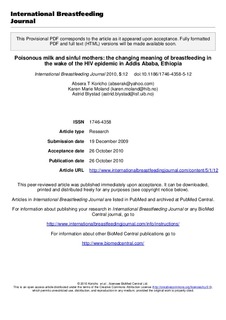| dc.contributor.author | Koricho, Absera T | |
| dc.contributor.author | Moland, Karen Marie | |
| dc.contributor.author | Blystad, Astrid | |
| dc.date.accessioned | 2018-02-01T15:08:18Z | |
| dc.date.available | 2018-02-01T15:08:18Z | |
| dc.date.issued | 2010-09-26 | |
| dc.identifier.citation | doi:10.1186/1746-4358-5-12 | en_US |
| dc.identifier.issn | 1746-4358 | |
| dc.identifier.uri | http://hdl.handle.net/11250/2481750 | |
| dc.description.abstract | Background: Breastfeeding remains normative and vital for child survival in the developing world. However, knowledge of the risk of Human Immunodeficiency Virus (HIV) transmission through breastfeeding has brought to attention the controversy of whether breastfeeding can be safely practiced by HIV positive mothers. Prevention of mother to child transmission (PMTCT) programs provide prevention services to HIV positive mothers including infant feeding counseling based on international guidelines. This study aimed at exploring infant feeding choices and how breastfeeding and the risk of HIV transmission through breastfeeding was interpreted among HIV positive mothers and their counselors in PMTCT programs in Addis Ababa, Ethiopia. Methods: The study was conducted in the PMTCT clinics in two governmental hospitals in Addis Ababa, Ethiopia, using qualitative interviews and participant observation. Twenty two HIV positive mothers and ten health professionals working in PMTCT clinics were interviewed. Results: The study revealed that HIV positive mothers have developed an immense fear of breast milk which is out of proportion compared to the evidence of risk of transmission documented. The fear is expressed through avoidance of breastfeeding or, if no other choice is available, through an intense unease with the breastfeeding situation, and through expressions of sin, guilt, blame and regret. Health professionals working in the PMTCT programs seemed to largely share the fear of HIV positive mother's breast milk, and their anxiety was reflected in the counseling services they provided. Formula feeding was the preferred infant feeding method, and was chosen also by HIV positive women who had to beg in the streets for survival. Conclusions: The fear of breast milk that seems to have developed among counselors and HIV positive mothers in the wake of the HIV epidemic may challenge a well established breastfeeding culture and calls for public health action. Based on strong evidence of the risks when infants are not exclusively breastfed, there is a great need to protect breastfeeding from pressures of replacement feeding and to promote exclusive breastfeeding as the best infant feeding option for HIV positive and HIV negative mothers alike. | en_US |
| dc.language.iso | eng | en_US |
| dc.publisher | BioMed Central | en_US |
| dc.relation.ispartofseries | International Breastfeeding Journal | en_US |
| dc.relation.ispartofseries | 2010, 5:2 | en_US |
| dc.rights | Navngivelse 2.0 Internasjonal | |
| dc.rights.uri | http://creativecommons.org/licenses/by/2.0/deed.no | |
| dc.subject.other | breastfeeding | en_US |
| dc.subject.other | HIV | en_US |
| dc.subject.other | prevention of mother to child transmission | en_US |
| dc.subject.other | HIV transmission | en_US |
| dc.subject.other | HIV positive mothers | en_US |
| dc.subject.other | ethiopia | en_US |
| dc.title | Poisonous milk and sinful mothers: the changing meaning of breastfeeding in the wake of the HIV epidemic in Addis Ababa, Ethiopia | en_US |
| dc.type | Peer reviewed | en_US |
| dc.type | Journal article | en_US |
| dc.subject.nsi | VDP::Medisinske Fag: 700::Helsefag: 800::Samfunnsmedisin, sosialmedisin: 801 | en_US |
| dc.subject.nsi | VDP::Medisinske Fag: 700::Helsefag: 800::Sykepleievitenskap: 808 | en_US |

